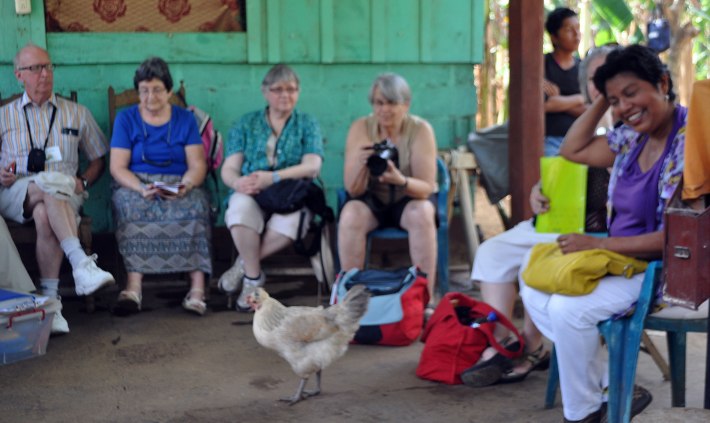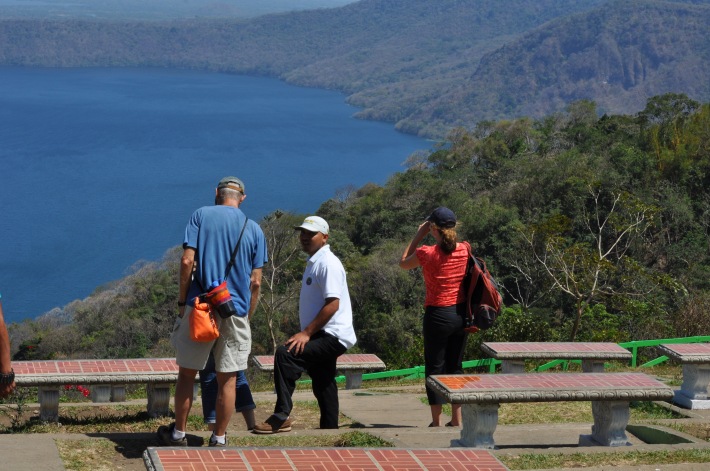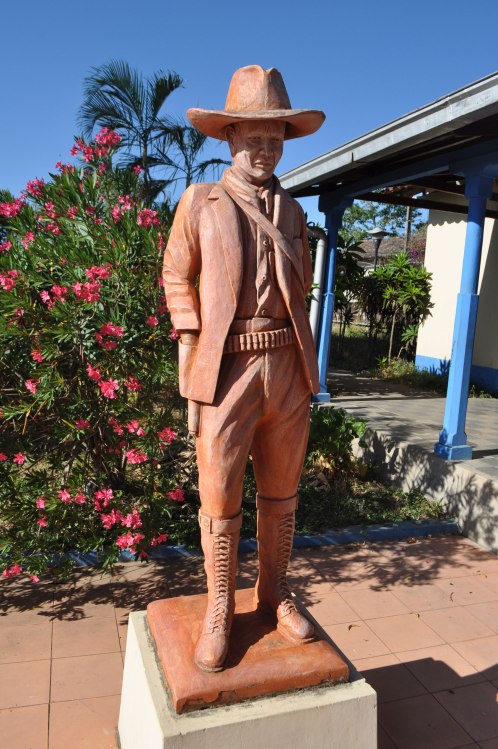MASAYA – It shouldn’t have come as any surprise when the large chicken joined the meeting, striding around as if waiting for her turn to talk. After all the dog had already done his inspection, and the cat made a brief cameo prior to the chicks deciding they were going to make a crossing. Nobody seemed to mind.We had travelled from the capital to Masaya to visit a former Horizons of Friendship partnership project that no longer needed Horizons. In the development world, that’s an outstanding success. Goal achieved.
Fifty-five women belong to the Masaya-based co-op that is involved with everything from mixed farming to embroidered clothes, artwork and producing dolls. The farm was just one site where we could see the co-op at work. Gathered in a circle in an open shelter, several co-op members introduced themselves and talked about what the co-op meant to them.
While women fought side by side in combat with the men during the revolution, it was the men that migrated into positions of authority and power when civil society resumed in the country. The co-op was intended to address the fact that the struggle of women in Nicaraguan society was not a priority to those in power.
Angela, the co-op president, said they faced skepticism over the organizations survival. The local men did not believe that a group of women could become successful at business. She said they were expected to last no more than two years, which only fueled their desire to get it right.
While the trend in Nicaragua is for large corporations to run large mono-culture farms, the women wanted to address the question of food security by diversifying what they were to grow. While bananas were evident on the farm, there was much more — including livestock and even a cacao tree. At one point we had to stop the meeting when a client showed up looking to grind seven pounds of corn using equipment in the shelter. The charge: 40 cents.
The co-op works on many levels, from linking with Horizons to provide needed equipment and materials to educating their members on good farming technique. Gloria, one of the co-op members present, said they have put in much time and effort recently to learn about organic processes. They have also begun a bee keeping project. Angela says that not only are they learning to be good business people, but they were also in the process of changing themselves and their society. That includes breaking the cycle of family violence. It also means getting the men in their lives to take on non-traditional roles, including looking after the kids when the women go off to their meetings.
As President of the co-op, she spoke about gaining experience through exchanges facilitated by organizations like Horizons. That included visiting with women’s groups in Canada.
The women are also relying on another Horizons Partner in Nicaragua, Maria Elena Cuadra, to learn more about how to be effective in the political process.
The co-op is presently frustrated by a new law intended to make it easier for Nicaraguan women to own land. More women in the co-op rent rather than own their farms, limiting their choices of what to grow. Banana trees, for example, while lucrative, take a long time to grow. The result is the women are forced to grow more corn and beans, crops that produce a quick yield. While the law is well intended, the Sandinista government has put no money behind the initiative, rendering it ineffective. Later, back at the co-op’s offices in Masaya, we were shown a poster produced by the co-op urging the Ortega government to put money behind the law.
Angela says that they have shown the government what they can do renting the land. “Imagine what we could do if we owned the land.”Self-sustaining, the co-op is now looking at expanding. They are concerned that new co-op members embrace the responsibility that comes with the benefits. The co-op had been through this before. Twenty years ago there were 155 members, few really involved in meaningful participation. The situation became unmanageable. Now a new member is expected to undergo 40 hours of training in what it means to be a member of an economic co-op like this.
It’s difficult, particularly for those who must still work in the factories. The Free Trade zones have meant degraded labour laws that give these workers little free time to participate in the life of the co-op.
The previous night Dr. Harold Campos highlighted the Sandinista’s vision for economic development. It is a government that is looking for partnerships, not dependency, development not charity.The kind of partnership projects Horizons takes on does fit this model, the Masaya women’s co-op serving as proof that this can be done in an environment of mutual respect.
After leaving the co-op we visited the Laguna de Apoyo – a volcanic crater lake and nature reserve — and bought local handcrafts from artisans in Los Pueblos Blancos.
On the way back we visited the original home of revolutionary hero Augusto Sandino, the building now a library and museum. Again we were reminded that while the party in power may call itself Sandinista, many believe they have taken a divergent path from Sandino’s original vision.




No comments:
Post a Comment